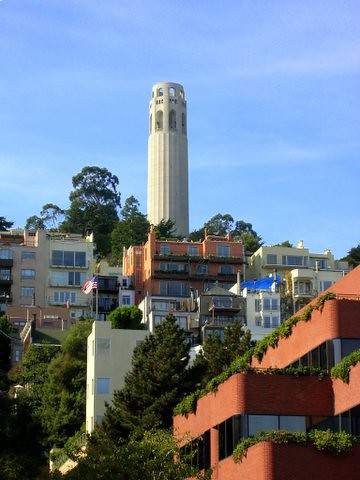Monday, January 17, 2005
Martin Luther King - Letter from Birmingham Jail
Today is a federal holiday to honor the Reverend Dr. Martin Luther King, Jr. Schools, libraries, city, state and federal offices are closed. The Post Office won't be delivering mail. The stock market is closed. But here in Silicon Valley, most private firms are not taking the day off.
I read an interview this past week in Parade Magazine with a young woman who used to make appearances at churches and other gatherings when she was just seven years old, bringing people to tears by reciting King's I Have A Dream speech. Today, she is a young adult, dedicating herself to that dream.
King should be remembered not only for his dream, but also for his work to bring that dream to reality, for his decision that the time had come to take steps to reach that dream.
In April, 1963, four months before he gave his Dream speech, King was thrown in jail for leading protests in Birmingham, AL.
Local white clergymen in a letter to the Birmingham News criticized King for coming to Birmingham as an "outsider" to lead demonstrations that were "unwise and untimely."
King responded with what is probably his second-best known work, his Letter from Birmingham Jail wherein he says
[...]
We know through painful experience that freedom is never voluntarily given by the oppressor; it must be demanded by the oppressed. Frankly, I have yet to engage in a direct-action campaign that was "well timed" in the view of those who have not suffered unduly from the disease of segregation. For years now I have heard the word "Wait!" It rings in the ear of every Negro with piercing familiarity. This "Wait" has almost always meant 'Never." We must come to see, with one of our distinguished jurists, that "justice too long delayed is justice denied."
We have waited for more than 340 years for our constitutional and God-given rights. The nations of Asia and Africa are moving with jetlike speed toward gaining political independence, but we stiff creep at horse-and-buggy pace toward gaining a cup of coffee at a lunch counter. Perhaps it is easy for those who have never felt the stinging dark of segregation to say, "Wait." But when you have seen vicious mobs lynch your mothers and fathers at will and drown your sisters and brothers at whim; when you have seen hate-filled policemen curse, kick and even kill your black brothers and sisters; when you see the vast majority of your twenty million Negro brothers smothering in an airtight cage of poverty in the midst of an affluent society; when you suddenly find your tongue twisted and your speech stammering as you seek to explain to your six-year-old daughter why she can't go to the public amusement park that has just been advertised on television, and see tears welling up in her eyes when she is told that Funtown is closed to colored children, and see ominous clouds of inferiority beginning to form in her little mental sky, and see her beginning to distort her personality by developing an unconscious bitterness toward white people; when you have to concoct an answer for a five-year-old son who is asking: "Daddy, why do white people treat colored people so mean?"; when you take a cross-county drive and find it necessary to sleep night after night in the uncomfortable corners of your automobile because no motel will accept you; when you are humiliated day in and day out by nagging signs reading "white" and "colored"; when your first name becomes "nigger," your middle name becomes "boy" (however old you are) and your last name becomes "John," and your wife and mother are never given the respected title "Mrs."; when you are harried by day and haunted by night by the fact that you are a Negro, living constantly at tiptoe stance, never quite knowing what to expect next, and are plagued with inner fears and outer resentments; when you no forever fighting a degenerating sense of "nobodiness" then you will understand why we find it difficult to wait. There comes a time when the cup of endurance runs over, and men are no longer willing to be plunged into the abyss of despair. I hope, sirs, you can understand our legitimate and unavoidable impatience.
[...]
I would hope, that if King could somehow see where we are today, he would be encouraged by how much things have changed. I would hope, that if King could somehow see where we are today, he would not despair, that things have not changed as much as they could ... or should.
Update: A friend just sent this link to the Washington, DC Martin Luther King, Jr. National Memorial Project Foundation, which is raising funds for a memorial in Washington, D.C. to commemorate the life and work of Dr. Martin Luther King, Jr. Caution: the site's lead page has both streaming audio excerpts of MLK's Dream speech and streaming video of other events and people. Takes a while to load even at broadband speeds, perhaps all the moreso because today is MLK Day and the URL is whizzing around the cyberweb.
I read an interview this past week in Parade Magazine with a young woman who used to make appearances at churches and other gatherings when she was just seven years old, bringing people to tears by reciting King's I Have A Dream speech. Today, she is a young adult, dedicating herself to that dream.
King should be remembered not only for his dream, but also for his work to bring that dream to reality, for his decision that the time had come to take steps to reach that dream.
In April, 1963, four months before he gave his Dream speech, King was thrown in jail for leading protests in Birmingham, AL.
Local white clergymen in a letter to the Birmingham News criticized King for coming to Birmingham as an "outsider" to lead demonstrations that were "unwise and untimely."
King responded with what is probably his second-best known work, his Letter from Birmingham Jail wherein he says
[...]
We know through painful experience that freedom is never voluntarily given by the oppressor; it must be demanded by the oppressed. Frankly, I have yet to engage in a direct-action campaign that was "well timed" in the view of those who have not suffered unduly from the disease of segregation. For years now I have heard the word "Wait!" It rings in the ear of every Negro with piercing familiarity. This "Wait" has almost always meant 'Never." We must come to see, with one of our distinguished jurists, that "justice too long delayed is justice denied."
We have waited for more than 340 years for our constitutional and God-given rights. The nations of Asia and Africa are moving with jetlike speed toward gaining political independence, but we stiff creep at horse-and-buggy pace toward gaining a cup of coffee at a lunch counter. Perhaps it is easy for those who have never felt the stinging dark of segregation to say, "Wait." But when you have seen vicious mobs lynch your mothers and fathers at will and drown your sisters and brothers at whim; when you have seen hate-filled policemen curse, kick and even kill your black brothers and sisters; when you see the vast majority of your twenty million Negro brothers smothering in an airtight cage of poverty in the midst of an affluent society; when you suddenly find your tongue twisted and your speech stammering as you seek to explain to your six-year-old daughter why she can't go to the public amusement park that has just been advertised on television, and see tears welling up in her eyes when she is told that Funtown is closed to colored children, and see ominous clouds of inferiority beginning to form in her little mental sky, and see her beginning to distort her personality by developing an unconscious bitterness toward white people; when you have to concoct an answer for a five-year-old son who is asking: "Daddy, why do white people treat colored people so mean?"; when you take a cross-county drive and find it necessary to sleep night after night in the uncomfortable corners of your automobile because no motel will accept you; when you are humiliated day in and day out by nagging signs reading "white" and "colored"; when your first name becomes "nigger," your middle name becomes "boy" (however old you are) and your last name becomes "John," and your wife and mother are never given the respected title "Mrs."; when you are harried by day and haunted by night by the fact that you are a Negro, living constantly at tiptoe stance, never quite knowing what to expect next, and are plagued with inner fears and outer resentments; when you no forever fighting a degenerating sense of "nobodiness" then you will understand why we find it difficult to wait. There comes a time when the cup of endurance runs over, and men are no longer willing to be plunged into the abyss of despair. I hope, sirs, you can understand our legitimate and unavoidable impatience.
[...]
I would hope, that if King could somehow see where we are today, he would be encouraged by how much things have changed. I would hope, that if King could somehow see where we are today, he would not despair, that things have not changed as much as they could ... or should.
Update: A friend just sent this link to the Washington, DC Martin Luther King, Jr. National Memorial Project Foundation, which is raising funds for a memorial in Washington, D.C. to commemorate the life and work of Dr. Martin Luther King, Jr. Caution: the site's lead page has both streaming audio excerpts of MLK's Dream speech and streaming video of other events and people. Takes a while to load even at broadband speeds, perhaps all the moreso because today is MLK Day and the URL is whizzing around the cyberweb.
Labels: URL
: views from the Hill
Bertold Brecht:
Everything changes. You can make
A fresh start with your final breath.
But what has happened has happened. And the water
You once poured into the wine cannot be
Drained off again.
Everything changes. You can make
A fresh start with your final breath.
But what has happened has happened. And the water
You once poured into the wine cannot be
Drained off again.


